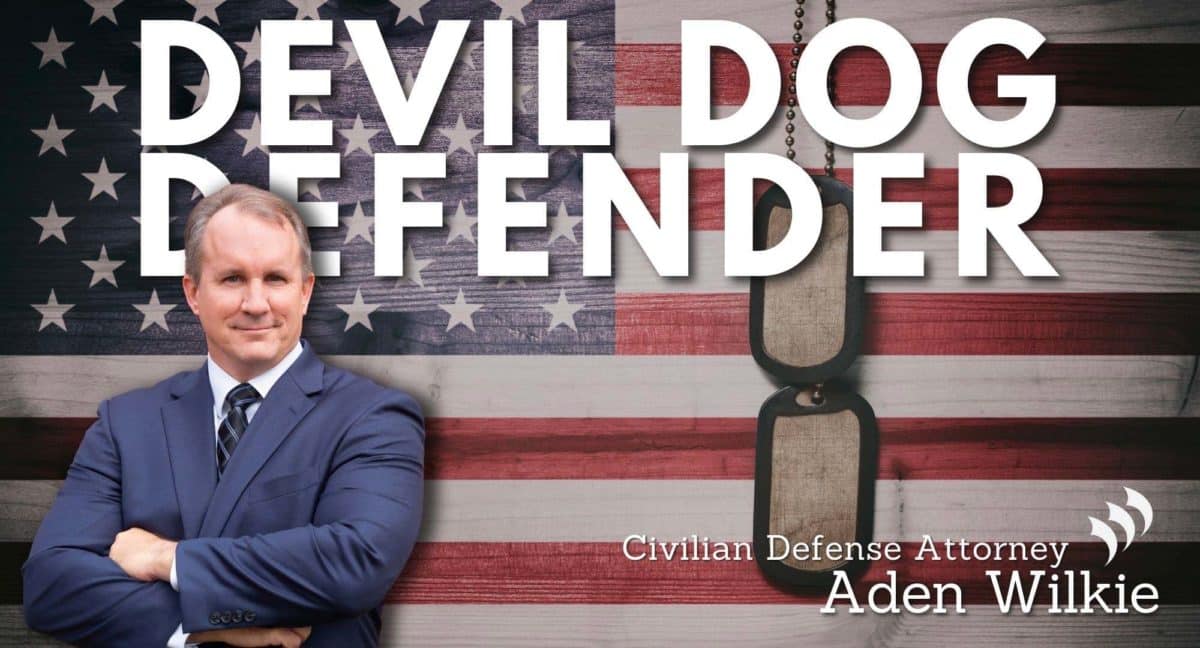
When a civilian is arrested and charged with a crime, they have the choice of hiring their own private defense counsel or accepting a free court-appointed attorney. In the case of a military service member, they also have the choice between a free, military-appointed Judge Advocate (JA) or Judge Advocate Generals Corps (JAG) attorney and a private civilian defense lawyer.
So, the question is, why would someone pay for private counsel when they have the option of a free military counsel? Well, simply put, for similar reasons a civilian defendant hires their own private representation as opposed to accepting a court-appointed attorney from the state: experience and unfettered advocacy.
Aden Wilkie of The Wilkie Law Group is a retired Marine Corp trial and defense lawyer with six deployments and several high-profile positions as a trial attorney and Staff Judge Advocate under his belt. During his twenty-two years of active service, he witnessed firsthand the many flaws of the military justice system and how it disproportionately stacks the deck against the accused.
Now, as a civilian practitioner with unfettered freedom of legal maneuver on the legal battlespace and no undue influence from a superior military chain of command, Aden Wilkie is dedicated to helping his military clients successfully navigate a legal system that leaves them vulnerable and at a serious disadvantage.
In this post, we will discuss some of the ugly realities of the military justice system and how they could impact a uniformed military defense attorney compared to a civilian practitioner like Aden Wilkie, and why choosing one over the other could make all the difference in your criminal case. To learn more about the Devil Dog Defender or to schedule an initial consultation today, give The Wilkie Law Group a call today at (910) 333-9626 or fill out our online intake form here.
Military Lawyers Vs. Civilian Lawyers: The Realities of External Pressures
There are many reasons why military members facing criminal charges are encouraged to seek private counsel. To begin, a court-martial is rarely a fair fight. From the moment a service member is being investigated for a crime, the odds are stacked against them. Though a military lawyer may be assigned to represent you, they are not independent of the possible influences of the military chain of command prosecuting you or their technical chain of command (higher-ranking military attorneys).
Specifically, a military defense attorney will not always have the honor of exclusively defending military members. Their next duty assignment may have them prosecuting similar cases or a different job like advising commanders as to the legal aspects of a case like yours. Overall, this disparate legal experience makes the officer and lawyer in question a better member of the service and better military attorney.
However, as can be seen in some of the recent articles contained within publications like Task and Purpose or the Warhorse in some circumstances the system can be abused, and young defense counsel can come under pressure and scrutiny from people senior to them in their service. And whether consciously or unconsciously such pressures could chill the young counsel’s zealous defense of your case. This is not to say all counsel, nor all situations suffer from this unfortunate malady of express or implied influence.
However, a brief google search within each of the military services will show such things do occur. And here is the most difficult part, most of the time such improper actions by commanders and superior military lawyers are usually done out of sight and in the dark. So, you and your counsel may not know until too late.
Alternatively, it is a big ask in some cases for a young Lieutenant or Captain to call out such behavior or inappropriate actions by superiors. And a whole other discussion or article could be dedicated to the potential influences from Congress, the media, and activist groups can have on your commander and the process.
Comparatively, an experienced civilian counsel does have nor suffer from these pressures. An attorney like Mr. Wilkie has no concerns about ruffling some feathers when it is called for in a case. And he has the requisite experience to perceive when these things are happening and the best way to address or react to them in a case.
Specializing in Military Law and Timing of Assistance
Military courts also follow different rules than civilian courts. For example, from the beginning of your case, you may already be placed at a disadvantage, as the military will not assign you a military attorney until formal charges are brought against you.
From the moment you learn you are being investigated; you should equip the help of a local civilian military lawyer with experience handling military cases. Having skilled legal representation on your side during such a critical time in your case can help you get ahead of the charges before the government develops a solid case against you.
Your civilian military attorney will protect your rights during the investigation phase and guide you through decisions like whether to subject yourself to an interrogation (typically never). If charges are later preferred and a military lawyer is assigned to you, your civilian attorney will work alongside them to help craft the best possible defense moving forward.
In many cases, the young military counsel (regardless of service) is prohibited from providing you legal advice or assistance until much later in the legal process.
Experience Counts
Most military attorneys are new to the game and do not have anything close to the twenty-three years of experience that Aden Wilkie has when it comes to military proceedings, such as an Article 32 hearing or court-martial. In fact, most military attorneys typically have less than five, more like three years of experience working in the military court system.
In contrast, Mr. Wilkie has been practicing law since 1999. That gives him over two decades of experience practicing law. The level of experience of your attorney can make a major difference in the outcome of your court-martial case.

Some Examples Showing the Need for Military Counsel
There have been plenty of cases lately that we have been able to see firsthand just how important it is for military personnel to obtain the legal services of private civilian attorneys. A prime example from the Marine Corps is the case of Gunnery Sgts. Joshua Negron and Daniel Draher and Chief Petty Officer Eric Gilmet.
The men face voluntary manslaughter and negligent homicide charges, among other charges, for the death of Army Green Beret Veteran and contractor Rick Anthony Rodriquez in 2019 after a physical altercation outside of an Iraqi bar. The trials for the Marine Raiders and Navy corpsman have been delayed as allegations arise citing unlawful command influence on behalf of senior Marine attorney, Col. Christopher B. Shaw.
It is reported that in a meeting with several military attorneys at Camp Lejeune, including Matthew Thomas, a Marine and lead defense attorney on the aforementioned homicide trial, Col. Shaw clearly expressed that protections for military lawyers do not exist.
“Our community is small,” said Shaw, according to Thomas and an article from The War Horse. “There are promotion boards, and the lawyer on the promotion board will know you.”
The same article goes on to say that Col. Shaw’s statements “represent one of the clearest examples of how military leaders can abuse their authority both during and outside court proceedings, and they will further degrade trust between uniformed attorneys and service members who face judicial punishments.”
Another example can be found in the case of Lance Cpl. Kameron Duval, who, after attempting to take his own life, is now facing a felony assault charge at a general court-martial. According to an article by Thomas J. Brennan from The War Horse, Duval waded out into the water of the New River at Camp Lejeune with the intent to kill himself with a knife and let his body float downstream.
A subordinate Marine attempted to subdue Duval but received injuries from the knife in Duval’s hand in the process. Rather than receive the necessary psychiatric help he needed, Duval was sent to military police headquarters only after a brief time in inpatient care where he was questioned without an attorney for six hours. He was later charged with aggravated assault against a fellow service member.
Duval was imprisoned for eight months before his trial, all the while both the defense and prosecution’s expert witnesses agreed that the Marine suffered severe PTSD. However, Marine Corps officials claimed he was faking his mental illness and refused to drop the charges.
Depending on the posture of the case, even if a young military counsel is willing to push back against such actions by the chain of command, they may be prohibited from acting by military regulation that controls how and when such representation can occur. Mr. Wilkie is not bound by such service limitation of when and where he can provide legal counsel and defense to a military member.
This is not the only case of the military weaponizing the mental health of their service members. There are numerous cases just like this that perfectly demonstrate how the system chooses to punish a mentally ill military member rather than get them the psychiatric help they need.
While no outcome is ever guaranteed, the presence of a more seasoned civilian defense attorney may drive the command to different decisions or to do the right thing sooner rather than later. As we have seen in some of the cases discussed above, experience is only one of the many factors to consider when it comes to the decision of whether to stick with free military counsel or hire a private civilian criminal defense attorney.
Another concern that is laid bare by comments made by senior leaders like Colonel Shaw is the reality of the collision of zealous advocacy of a client and personal interests of career progression. How can a military defendant be confident that his counsel is not influenced or chilled by such influences when senior officers are quite clearly directly making threats to junior counsel? It should not be this way, but it is and until it changes is a concern to be acknowledged by an individual facing the choice of hiring a private attorney or sticking with the free military counsel.

How The Wilkie Law Group Can Help You Fight Your Criminal Charges in the Military
As you can see, there are several significant differences in the way cases are managed within the military justice system and outside of it. With time served both as a military attorney and a private civilian lawyer specializing in military law, Aden Wilkie can understand how things work from both ends. He is completely familiarized with military law and knows how it can be used against military defendants.
As a private Jacksonville criminal defense attorney and civilian-military lawyer, Aden will consult with you as soon as you learn you are under investigation, rather than waiting until the charges are already preferred. He will get straight to work on your defense while advising you of your rights and guiding you through the entire process.
Whether your case is on base, off base, or one that involves both civilian and military authorities, Aden Wilkie will never be influenced or intimidated by other parties while defending you and your rights. Aden Wilkie will consider only YOUR best interests and fight aggressively to achieve justice on your behalf. For a consultation with The Wilkie Law Group, call (910) 333-9626 or fill out our online submission form today.





